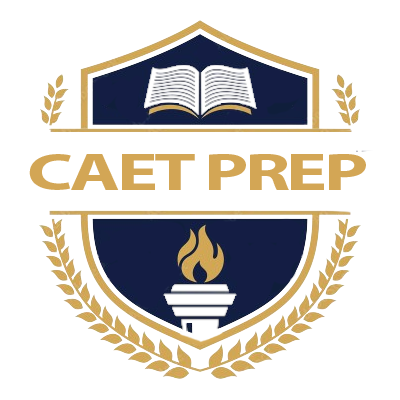Syllabus Covered in CAET 2024: IIT Delhi - Abu Dhabi
# Syllabus Covered in CAET 2024
## Physics
### Mechanics
- **Translational Motion**: Distance and Displacement, Speed and Velocity, Acceleration, Kinematic Equations, Graphs of Motion.
- **Forces**: Newton’s Laws of Motion, Newton’s Law of Universal Gravitation, Falling Objects, Projectiles.
- **Work, Energy, Power**: Center of Mass, Linear Momentum, and Impulse.
- **Rotational Motion**: Rotational Kinematics, Moment of Inertia, Torque, Angular Momentum, Newton’s Second Law for Rotation, Circular Motion, Static Equilibrium.
- **Fluid Mechanics**: Pascal's Principle, Archimedes’ Principle, Bernoulli’s Equation, Density and Pressure, Hydrodynamics, Fluids Flow.
### Electromagnetism
- **Electricity**: Electric Charge, Electrostatic Force, Electric Field, Electric Flux, Electrostatic Potential, Electrostatic Energy, Capacitors, Capacitance, and Dielectrics.
- **Electric Current**: Electromotive Force, Resistance, Resistivity, Ohm’s Law, Electric Power, Joule’s Heating, DC and AC Circuits.
- **Magnetism**: Magnetic Field, Magnetic Flux, Magnetic Force, Magnetic Torque, Electromagnetic Induction Laws, Inductance, Transformers.
### Waves and Optics
- **Waves**: Undamped Simple Harmonic Motion, Damped Oscillations, Driven Oscillations and Resonance, Mechanical Waves Characteristics, Mechanical Waves Behavior, Sound in Motion (Doppler Effect).
- **Optics**: Electromagnetic Waves, Polarization, Interference, Diffraction, Reflection, Refraction, Mirrors, Thin Lenses.
### Modern Physics
- **Theory of Relativity**: Einstein's General and Special Theories of Relativity, Equivalence Principle, Frames of Reference, Consequences (Length, Mass, Time, Energy, etc.).
- **Atomic Physics**: Matter Waves (De Broglie Wavelength), Heisenberg Uncertainty Principle, Blackbody Radiations, Photoelectric Effect, The Compton Effect, Atomic Models, and Atomic Spectra, Quantum Physics Applications.
- **Nuclear Physics**: Nuclear Structure and Properties, Radioactivity, Nuclear Reactions, Elementary Particles, Composite Particles.
### Thermal Physics
- **Temperature and Heat**: Internal Energy, Temperature, Heat, Temperature Scales, Thermal Equilibrium, Thermal Expansion, Specific Heat Capacity, Calorimetry, Phase Changes, Mechanisms of Heat Transfer.
- **Thermodynamics**: Ideal Gas Laws, Kinetic Molecular Theory, Zeroth Law of Thermodynamics (Absolute Zero), First and Second Laws of Thermodynamics.
## Chemistry
### Chemical Foundation
- Scientific Process, Conversion of S.I. Units, Temperature Scales and Conversions, Density Calculations, Scientific Notation, Significant Figures, Accuracy and Precision, Dimensional Analysis.
### Inorganic Chemistry
- Elements, Compounds, and Mixtures; Properties and Interconversions of Solids, Liquids, and Gases, Physical and Chemical Changes, Laws of Definite Proportion and Conservation of Mass, Modern Atomic Theory, Protons, Neutrons, and Electrons, Atomic Number, Mass Number, Isotopes, Electromagnetic Radiation, Planck's Quantum Theory, Photoelectric Effect, Emission Spectra, Electron Distribution, Pauli Exclusion Principle, Hund's Rule, Aufbau Principle, Periodic Table, Ionic and Covalent Bonds, Lewis Structures, Molecular Geometry, Intermolecular Forces, Heating and Cooling Curves, Stoichiometry, Electrolytic Properties, Acids and Bases, Redox Reactions, Electrolysis, Gravimetric Analysis.
### Organic Chemistry
- Properties and Reactions of Organic Compounds, Hydrocarbons (Alkanes, Alkenes, Alkynes), Isomerism, Aromatic Compounds, Alcohols, Aldehydes, Ketones, Carboxylic Acids, Esters, Amines, Polymers.
### Physical Chemistry
- Gas Quantities, Kinetic Molecular Theory, Gas Laws, Reaction Rates, Equilibrium, Thermodynamics (Enthalpy, Entropy, Gibbs Free Energy), Calorimetry.
### Analytical Chemistry
- Experimental Measurements, Qualitative Analysis, Chemical Safety, Instrumental Techniques.
### Nuclear Chemistry
- Radioactive Decay, Nuclear Transformations, Nuclear Fission, Nuclear Fusion, Half-Life, Uses and Risks of Radioactivity.
## Mathematics
### Algebra
- Expressions, Polynomial Operations, Zeros and Factors of Polynomials, Rational Functions, Equations and Inequalities, Systems of Equations, Functions, Linear and Exponential Models, Trigonometric Functions, Complex Numbers, Vectors, Matrices, Limits, Differentiation, Integration.
### Geometry
- Transformations, Congruence, Similarity, Trigonometry, Circles, Conic Sections, Coordinates, Volume Formulas, Two-Dimensional and Three-Dimensional Relationships.
### Statistics
- Data Interpretation, Probability, Statistical Models, Expected Values, Decision Outcomes.
This syllabus outlines the topics that students need to study for CAET 2024. A thorough understanding of these subjects will help candidates prepare effectively for the exam. Good luck with your preparation!



